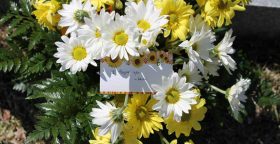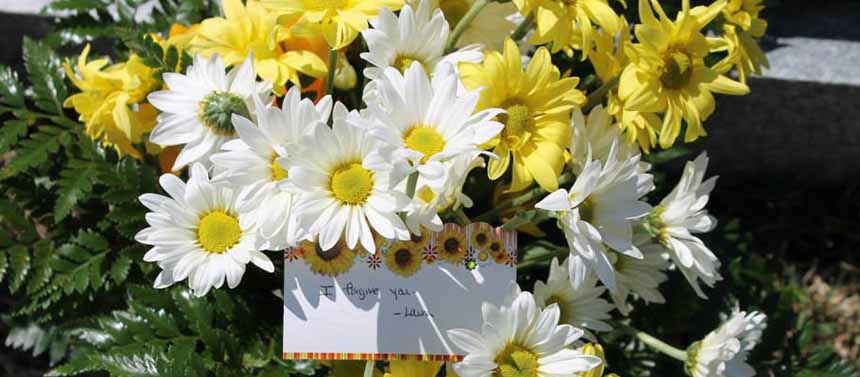“I’ve started and abandoned this letter numerous times during the past two decades. I start with wondering how to even address you — I can’t call you Dad, Daddy, Pop, I don’t recall ever addressing you as anything. I am 37 years old and am told often how I look just like you. But I don’t know you. I don’t want to wake up one day, find out you’ve passed, and never know a thing about you other than the few memories I have from when I was a little girl. I have some questions for you and would appreciate if you could email me, as that is the only means I feel comfortable communicating just yet. ~L”
A year ago I wrote those words in a letter I was planning to send, only to find out the father I hadn’t seen in 30 years had already died.
I was in my hotel room in Niagara Falls, enjoying a weekend getaway, when I received the call that you were gone. Three decades of abandonment came crashing down on me. I found it hard to breathe, as I thought about the last conversation I had with my father. It was the weekend of my ninth birthday.
“I’m moving farther upstate. To a place called Coxsackie. It’s very far so I won’t be able to see you too often.” As it was, I was supposed to see him every other Sunday and two weeks over the summer. The Sundays were inconsistent and the two summer weeks never happened. After he moved, he didn’t call; he didn’t write. He sent a $50 money order on Christmas and birthdays, and $25 a week were garnished from his wages as child support. And that was that.
When I returned from Niagara Falls, no one knew what to say to me. Somehow the usual, “I’m sorry for your loss” or “At least he’s not suffering now” comments seemed inappropriate. I thought I had grieved the loss of my father decades ago, and here I was faced with the reality that I hadn’t. I was not privy to his funeral arrangements — his third wife handled those, and I never knew her — so I decided that the only way to achieve any kind of closure was to stage my own service.
And that’s when I decided on the Ceremonial Purging.
I planned a road trip to his grave some 500 miles away — and a few months after I found out that he had died, I started out. The quiet moments during the drive gave me pause to think about the man who left his children and started a new life with another woman and her son. Up until my arrival in the small rural town in North Carolina where his relative lived, I still had no plan for what I’d do at his grave.
At 3 a.m., finding myself unable to sleep, I went to the front desk of the hotel and asked them to print five copies of a letter I wrote him, but never sent. I found the only florist in town and asked him, “What can you make me for $10?” He went in back and said, “There are cards there, feel free to fill one out.”
As the florist was walking back with a bouquet of yellow and white daisies, I grabbed a blank card and wrote the words, “I forgive you.” I stuck it in my pocket before I could change my mind.
The cemetery was small and rather sad-looking. I drove past it three times. I made my way to the landmark I was instructed to park near, and I grabbed the first aid kit from my trunk and an empty can of diet Dr. Pepper. A few minutes of walking up and down aisles and then I saw it. The gravestone with my last name on it. With the name of the father I hardly knew. A man reduced to ashes after a life lived lying to himself and those around him about what he’d done and where he’d been. The tears began to flow.
I dug a hole and planted the flowers; a copy of a letter I had written to him — in it, I said all of the things I wish I had had a chance to tell him before he died — was in a Ziploc bag, tucked into the arrangement. I hoped someone would find it and read of the hurt and devastation his absence caused me. I slowly read aloud the letter, pausing where necessary, and once I was done, I used the lighter in my first aid kit and burnt the letter in the soda can. I stood there —breathing, crying, exhaling. I adhered the “I forgive you” card to his headstone, using some surgical tape. I packed up my things, walked back to the car, blew my nose one last time, and programmed the GPS for my next destination.
The next day I set out to hike a section of the Appalachian Trail. After three hours of intense uphill climbing, and almost quitting a half-dozen times, I reached the summit. At that moment it occurred to me how small we are. I sat there for an hour, just staring at the view around me. Before packing up to leave, I shook out the soda can of “ashes” and watched the pieces fly away.
I’ll never know why he left or how he could live his life as if I’d never existed. I’ll never know if he thought of me when he was handed his death sentence, or if his abandonment of me was part of his end-of-life reflection. It took a thousand miles of driving for me to accept that my father was just a man, making decisions like any other adult. And while I offered forgiveness at his gravesite, I will continue every day to heal a little bit more, to let go a bit. No more regrets. No more keeping stuff inside. We come into this world alone and we leave alone. Drop the top on the car and let it all release in the wind on the highway. Just a girl in her Camaro, learning to make peace with the past.
Laura is an educator in New York City, and a lover of politics. When she’s not advocating for young people, she is usually found driving around the country in her convertible. She’s on Twitter @angrynotcute.










